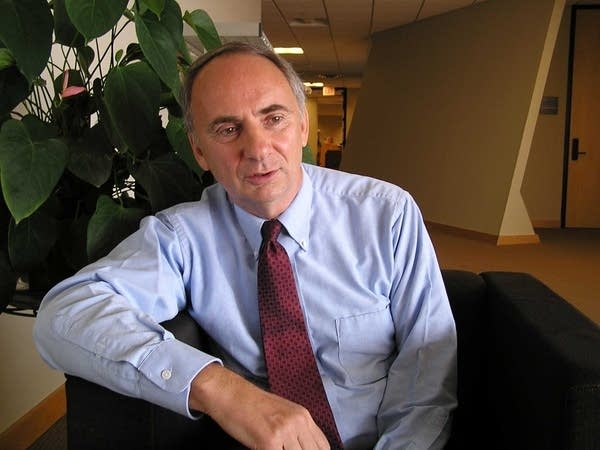Can state government jump-start the economy?
Go Deeper.
Create an account or log in to save stories.
Like this?
Thanks for liking this story! We have added it to a list of your favorite stories.

Economic experts have differed on whether Minnesota is already in a recession. The state lost about 23,000 jobs in the past six months. There's also debate on whether a national recession is in the offing. Some prominent experts do believe one will hit this year.
If we are in a recession or are about to slip into one, economist Toby Madden at the Federal Reserve Bank of Minneapolis says, "Don't panic."
He says the word recession sounds dire and suggests the whole economy is tanking, but, in fact, the economy still continues to be productive, albeit less so than before. Madden says you could think about it with this analogy of the human body.

"You're eating right, exercising, doing well; you've got a strong overall body, overall economy. However, you might not be looking and you might stub your toe. It's very painful, but what are you going to do about? You might disinfect it and put some ice on it," Madden says. "But you're not going to have major surgery."
Turn Up Your Support
MPR News helps you turn down the noise and build shared understanding. Turn up your support for this public resource and keep trusted journalism accessible to all.
Madden says a few aspirin and a little time will heal that stubbed toe.
And he advises that the state not attend to the current economic pain with heavier meds, like tax cuts, especially when the state has a projected deficit of about $370 million. Madden says the state can't afford to lose tax revenues.
But if it's just aspirin that's needed, there's plenty of it on the state's shelves, according to the Minnesota Department of Employment and Economic Development. For example, there's a state program that offers some laid-off workers financial assistance to get training in a new field. And the state runs 47 Workforce Centers across Minnesota to help job seekers find work.
But some people dispute that what ails us is really as minor as a stubbed toe, and that the state only needs to dispense mild painkillers. House Majority Leader Tony Sertich, DFL- Chisholm, thinks the condition is graver.
I think the families that are seeing rising medical costs, the folks who are unemployed or seeing less wages, it's not a toe-stub.
"I think the families that are seeing rising medical costs, the folks who are unemployed or seeing less wages, it's not a toe stub," Sertich says. "And even if you do stub your toe, the next time you walk across, you're either going to take a different path or move the furniture. And that's what we're looking at doing here with a bonding bill, a jobs bill, a comprehensive transportation bill. That, I think, will help stimulate our economy more so that we don't stub our toe in the future."
DFLers say those bills could create more than 30,000 jobs, but some Republicans question whether that's true. The proposals involve raising the gas tax, among others.
Gov. Pawlenty would support a nickel-a-gallon gas tax increase for transportation projects -- if there's an offsetting tax cut somewhere else. But he says he otherwise opposes job creation initiatives bearing tax increases. Pawlenty made his tax aversion clear in his State of the State address Tuesday.
"I still have an important tool to restrain taxes and spending," he says. "I call it the 'taxpayer protection pen,' otherwise known as the veto pen. And as I think you know, I will not hesitate to use it to keep government from digging into your wallets."
But even if the DFL-sponsored bills went through, they might not do much, according to state economist Tom Stinson. He has his own analogy to explain why. Think of the current economic situation as a car trying to make its way up a sloping driveway.
"Sometimes you zip right up and there's no problem. But other times, you get up there and part way up you begin to spin your wheels, and you may even slip back a little bit," he notes.
Stinson says if the state wants to provide a little push to make it up the economic driveway, bills aimed at job creation may not do the job.
He says only about 15 percent of a typical capital budget gets spent in the following fiscal year. So any extra push would probably come after the car has already regained traction and is up the slope.
"You certainly don't need help after you're on the flat area and not spinning your wheels anymore," says Stinson.
But a well-timed push can do the job, and Stinson thinks the federal stimulus package President Bush signed into law this week will provide the necessary help. Stinson says in this case, it's the federal government, not the state of Minnesota, that's best positioned to push us up the hill.
Dear reader,
The trustworthy and factual news you find here at MPR News relies on the generosity of readers like you.
Your donation ensures that our journalism remains available to all, connecting communities and facilitating better conversations for everyone.
Will you make a gift today to help keep this trusted new source accessible to all?




